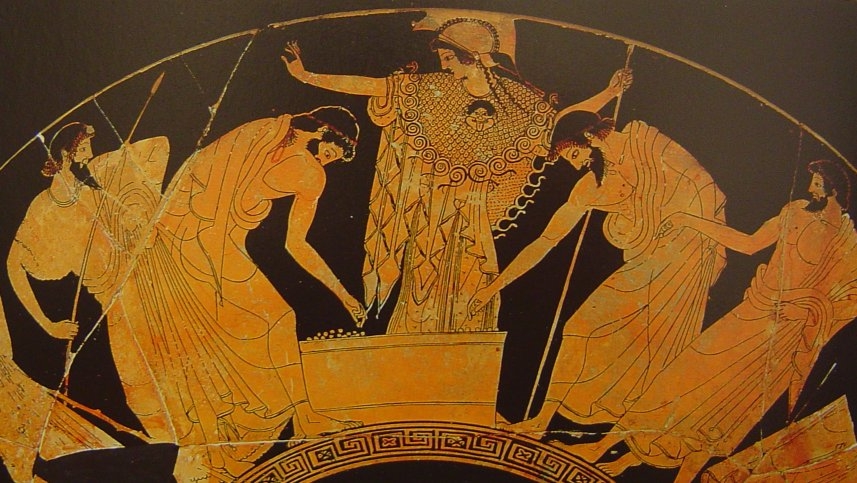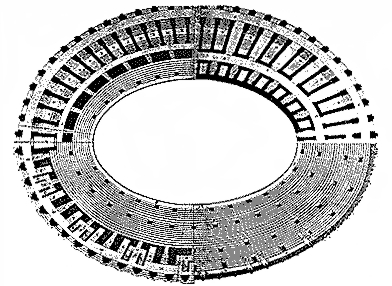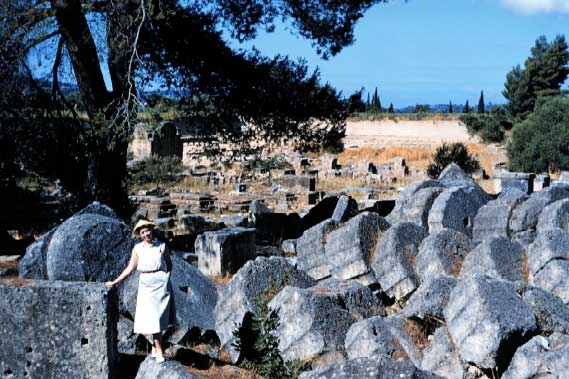



cun cùli gùsi lasà caschè da i öc' fàusi mè di vulp e bzògna vëdji pö andén la stànsa,mè i dörvu i rübinöt.Ma parchè i piànzu dònca an fin di cünt.Gnànca che pö i düvìisu andè a la mort.T'àvi da vëdla ànche la regìna,quand l'ha savì che la spus partìva par fè luntàn periculùza guèra,nén mèc da dòrmi sùla i dispiazìva,ma l'éra so fratèl che 'l partìva,ad l'astès sang che andén a lé i bujìva pensànd al perìcul ad cùla guèra.Pö l'è capì pü gnénte e l'è 'ndà 'n tèra.Vàrda che efèt a fa an gros dulùr.T'è nén la stèsa dòna che,maznà,t'è fat na ròba da rastè 'ncantà?che pòchi àuti i avrìu pudì fè?Par che razòn,an fin t'è spuzà an re?che cumpasiòn i fàvu cùli paròli che 't dizìvi al to om a la parténsa.O quant friè cual man,i öc' rus da 'l piànzi.Ma mè tlu spiéghi,dònca,as cambiamént?Cuzì difìcil l'è,par chi völ bén,separèsi dal corp dla so metà?O quant preghè t'è fat parchè 'l turnéisa tra 'l füm e 'l sang di tor sacrificà e tüti i sant che ti t'è scumudà.L'è nén pasài tant che ànche l'Azia al re a l'è giuntàla al so Egìt e 'lùra a l'è mantnì cùla prumësa che l'àva fat prìma che 'l re partéisa.Ma tlu giür,pròpi 'nsla mè tèsta i giür,che mi gni vìa da ti i vulìva nén.E che 'm tùca 'l castìg sa l'è nén véra che l'è giüst che i àbiu cùi che i giüru 'l fàus.Ma andè còntra 'l fèr,chi l'è ca pöl?L'è düvì cédi fin cul mont pü àut ad tüti cùi che i pàsa adsùra 'l sul quand che i Persiàn ién fàsi an mar tüt növ e ién traversà l'Athos da 'nsla nav.Che i pudìvu fè di pòvri cavéi se 'l fèr rezìstu nén la péra e 'l màrmu.Che 'l diàu av pòrta vìa brüta ràsa di Càlibi che iéi mustà par prim a fugnè e scavè sut tèra 'nti cròti par truvè cul metàl e fèlu dür calàndlu càud bujént anl'àqua zlà.D'àuti cavéi,rastà là,luntàn da mi, iéru lì che i pianzìvu mè na vì,dal brüt destìn che l'àva separàni,quand mi da l'àut iù santì 'n vént fort:a l'éra 'l cavàl vulùr che l'ateràva e giüst avzìn'a a mi l'è vnì puzèsi,cul ipogrifo Lòcride Arsinòe,fratèl binèl ad Mèmnone Etiòpe.Delicatamént,pö,lü l'è cariàmi e sübit l'è ausàsi drit an cél pasànd la nöt travèrs a tànti stéili a l'è purtàmi 'nsi ginùi dla déa che völ l'amùr sìa ciar e pulìt mè ién i giurnà 'd sul a primavéra.E pròpi lé,Vénere Zefirìte,tant venerà 'nsla spiàgia Canopéa l'àva mandàmi cùla bràva bèstia da la spiàgia 'd Canòpo andùa l'éra parchè l'avéisa nén da stè an cél cùla curòn'a 'd fiur dla bèla Arianna,iéru stat i fiur pustà 'nsla tèsta,ünic ricòrd ad cùla bèla fèsta.Dès ànche nùi che iéru bèi cavéi,taià par vut da cùla tèsta biònda,ancù bagnà dal piànzi dla regìna,ién cunsacràmi stéili növi 'n cél,lüzénti e ciàri an mès a cùi antìchi.Tacà la Vèrgine,vzìn'a 'l Leòn,nén tant distànt dla fìa d' Licaòn,anviaràndmi vèr là 'ndùa a càla 'l sul mi i fag da guìda a la stéila Boòte che pü tàrdi 'd tüti a va bagnèsi 'n mar.Se dsùra la mè tèsta i sént la nöt i pas di cùi che ién i padròn dal mond,quand pö fa ciar mi i cal giü 'ntal mar e Téti m'ambràsa dai pé d'argént.Ma mi lonca iù 'n cör bzògna che i dìga.Ad tàzi i son nén bon parchè l'è véra.Làsa donca Ramnùzia che ma sfòga e che ia stéili ad mi ia spàrlu püra,che 'm fàgu a toc cun di paròli 'd föc.Tüti si bèli ròbi che i god chi,i son sincér,am dan nén al piazì che cumpénsa 'l turmént che iù 'ntal cör d'èsi luntàn da la regina,o nustalgìa d'èsi cà mìa.Da lé,mi,quand che iéra ancù tant giùuna,o quànti prufüm fin l'è fàmi béivi a mi che sàva nàn prìma che i füisu.Dès o spùzi che i völi bén a l'om,che dùi corp i séi e n'ànima sùla,mài che i cuncédi al corp deziderà al vos om che süstànd la sta tacà,mè,anvarsà 'l vèsti giü dai bèli spàli che i musti biùt la stòmi cuzì bianc,se prìma dal vazët di cul prufüm i avréi nén fat a mi la vòsa ufèrta,fàta cun al cör da dòni virtüuzi che iàn la religiòn dal so duvér,che cùla che 'ntal cör ià 'l tradimént e cunòs anche 'l let di n' àutar om,ufèrti,mi,da cùla nu völ mìa e i vàdu,sénsa efèt,finì 'ntla pùvar.Ma cùi che ién pròpi bén cubià,cuncòrdia e amùr i àugür che i àbiu sémp an cà.Ti pö,regìna,quand che,i dì dla fèsta,a la déa d'amùr tai farè unùr,làsji nén i prufüm manchè pü fin,ma fàini generùza 'n bèl regàl parchè mi i àbia ancùra a èsi tùa e turnè,bèi cavéi ansla to tèsta.Pö mi,di àuti stéili,al post an cél mnu 'mpòrta nén,duvéisa bén magàri brilè la stéila Uriòn vzìn'a l'Aquario.
qui stellarum ortus comperit atque bitus
flammeus ut rapidi solis nitor obscuretur
ut cedant certis sidera temporibus,
ut Triviam furtim sub Latmia saxa relegans dulcis amor gyro devocet aereo:
idem me ille Conon caelesti in lumine vidit e Beroniceo vertice caesariem
fulgentem clare, quam multis illa
deorum levia protendens brachia
pollicita est, qua rex tempestate
novo auctus hymenaeo vastatum finis iverat ssyrios,
dulcia nocturnae portans vestigia rixae,
quam de virgineis gesserat exuviis.
estne novis nuptis odio Venus?
anne parentum frustrantur falsis
gaudia lacrimulis, ubertim thalami quas intra limina fundunt? non, ita me divi,
vera gemunt, iverint.
id mea me multis docuit regina
querellis
invisente novo proelia torva viro.
et tu non orbum luxti deserta cubile,
sed fratris cari flebile discidium?
quam penitus maestas exedit cura medullas!
ut tibi tunc toto pectore sollicitae
sensibus ereptis mens excidit!
at ego certe cognoram a parva
virgine magnanimam. anne bonum
oblita es facinus, quo regium adepta es
coniugium, quod non fortior ausit alis?
sed tum maesta virum mittens quae verba locuta est!
Iuppiter, ut tristi lumina saepe manu!
quis te mutavit tantus deus? an quod amantes non longe a caro corpore abesse volunt?
atque ibi me cunctis pro dulci coniuge divis non sine taurino sanguine pollicita es, si reditum tetulisset.
is haut in tempore longo captam Asiam Aegypti finibus addiderat.
quis ego pro factis caelesti reddita coetu pristina vota novo munere dissolvo. allitterazione invita, o regina, tuo de vertice cessi, anafora
invita: adiuro teque tuumque caput,
digna ferat quod si quis inaniter
adiurarit:
sed qui se ferro postulet esse parem?
ille quoque eversus mons est,
quem maximum in oris progenies
Thiae clara supervehitur, cum Medi peperere novum mare,
cumque iuventus per medium classi barbara navit Athon.
quid facient crines, cum ferro talia cedant?
Iuppiter, ut Chalybon omne genus pereat, et qui principio sub terra quaerere venas institit ac ferri stringere duritiem!
abiunctae paulo ante comae mea fata sorores lugebant,
cum se Memnonis Aethiopis unigena impellens nutantibus aera pennis
obtulit Arsinoes Locridis ales equos, isque per aetherias me tollens avolat umbras et Veneris casto collocat in gremio. ipsa suum Zephyritis
eo famulum legarat Graia Canopitis incola litoribus.
hic dii vario ne solum in lumine caeli
ex Ariadnaeis aurea temporibus
fixa corona foret, sed nos quoque fulgeremus
devotae flavi verticis exuviae,
uvidulam a fluctu cedentem ad templa deum me
sidus in antiquis diva novum posuit.
Virginis et saevi contingens namque Leonis lumina, Callisto iuncta Lycaoniae, vertor in occasum, tardum dux ante Booten, qui vix sero alto mergitur Oceano. sed quamquam me nocte premunt vestigia divum,
lux autem canae Tethyi restituit
(pace tua fari hic liceat,
Ramnusia virgo,
namque ego non ullo vera
timore tegam,
nec si me infestis discerpent
sidera dictis, condita quin vere pectoris evolvam), non his tam laetor rebus,
quam me afore semper, afore me a dominae vertice discrucior, quicum ego, dum virgo quondam fuit omnibus
expers
unguentis, una milia multa bibi.
nunc vos, optato quas iunxit lumine taeda, non prius unanimis corpora coniugibus tradite nudantes reiecta veste papillas, quam iucunda mihi munera libet onyx, vester onyx, casto colitis quae iura cubili. sed quae se impuro dedit adulterio, illius a mala dona levis bibat irrita pulvis:
namque ego ab indignis praemia nulla peto. sed magis, o nuptae, semper concordia vestras, semper amor sedes incolat assiduus.
tu vero, regina, tuens cum sidera divam
placabis festis luminibus Venerem,
unguinis expertem non siris esse tuam me, sed potius largis affice muneribus.
sidera corruerint utinam! coma regia fiam, proximus
Hydrochoi fulgeret Oarion!
.
settings of the stars, how the fiery brightness of the scorching sun is darkened, how heavenly bodies depart at certain times, and how, from any orbit
in the air, sweet love stealthily calls Diana down and banishes her under the rocks of Latmus: that selfsame Conon, in the light of the heavens, saw me, a lock of long hair from the crown of Berenice's head. As I shimmered, Berenice promised me to many of the goddesses as she stretched her smooth arms forth, and in that season a king, glorified by his new marriage, had gone to sack Syrian land; he carried victorious marks from a nocturnal brawl that he had conducted for the spoils of a virgin.
But is sex really baleful to brides? Or can it be that their parentsí pleasures are spoiled by the duplicitous tearlets that brides shed in torrents within the bedroom's doorway? The gods sigh over these questions and therefore would not
please me. By her many complaints, her majesty taught me this when her new husband went to witness fierce battles: when you were alone, Berenice, you mourned not your destitute couch, but your lamentable separation from your brother, the second Ptolemy! How deeply your anxiety has eaten away at your sad interior! Your senses had been snatched away, and how your mind failed you then, when you were anxious with all your heart! Nevertheless, I knew for a
fact that you were brave since you were a little girl. Can it be that you have forgotten the good intrigue whereby you won your royal spouse because nobody else dared more bravely? But what sad words you spoke then, as you were letting your husband go! O Jupiter, how often you rubbed your eyes with your hand! What such a god has changed you? Can it be because lovers do not want to be away from a dear body? And then you offered me, not without the blood of a bull, to all of the gods in return for your sweet husband, if it would bring his return. He had added captured Asia
Minor to the borders of Egypt in what was not a long time. In return for these deeds, as a novel offering of thanks, I repay ancient prayers fulfilled by the heavenly crowds. Unwillingly, your majesty, I departed from your head, unwillingly: I swear by you and your head, but if anyone will have foolishly sworn by this, may he get the things he
deserves; but who would claim that he is equal to scissors? That largest mountain in the land, over which the bright sun is driven, was also brought down when the Persians produced a new sea and when a barbaric soldiery sailed by fleet through the center of Athos. What will hair do, when such things fall because of an iron blade? O Jupiter, I wish that the Chalybes and those who first began to look underground for veins of ore and draw the hardness of iron into bars would perish! My sisters were mourning my fate, the fate of hair recently severed, when the brother of Ethiopian king Memnon, beating against the air with changing wings, presented himself as the winged horse of Locrian Arsinoë, and, carrying me off through the shades of the sky, flew away to place me on the chaste lap of Venus. Arsinoë Zephyritis, who is Venus herself, the Greek inhabitant of Canopus' shores, had sent her servant there as an envoy.
From that point, in order that the golden crown from Ariadne's times should not become fixed alone in the sky's dappled radiance, but that the both of us should shine as dedicated mementos of a blonde head, divine Venus placed me in the regions of the gods, a new constellation among ancient constellations as I was damp, departing from a wave. For, touching the light of Virgo and savage Leo, and close to Callisto, who stands next to her father Lycaon, I wheel to my setting, leading the way before slow Boötes, who is immersed quite late in deep Oceanus. But although the footprints of the gods weigh me down at night, the light of day nevertheless gives me back to white haired Tethys. (Nemesis, by your leave, may I speak here? I will not hide truths out of fear, and if the stars will tear me to pieces for my troublesome words, I will not hide truths and fail to reveal what has been put away in a true heart.) I do not rejoice in these circumstances so much as I am vexed that I'll always, always be absent from the head of my mistress, the one with whom I drank many thousands of unguents, while she was a young girl formerly devoid of all perfumes. Now you, whom the wedding torch has united by a hoped for flame and who look after the laws with a chaste bed, when your clothing has been thrown aside, do not entrust your bodies
to your like-minded husbands as you denude your breasts, before an onyx jar, your onyx jar, pours me its delightful
libations. But she who has given herself to morally foul adultery - oh! - the shallow dust drinks her vain and malicious gifts; I seek no offerings from unworthy people. But rather, you wives, may harmony and an unremitting love always, always inhabit your homes. To be sure, your majesty, when you appease the divine Venus as you look at the stars on holidays, do not allow me, who am your own, to go unanointed, but rather treat me with abundant offerings. I
wish that the stars would fall down! I wish that I were to become royal hair and that Orion were now shining by Aquarius
© copyright 17-4-1999
by Brendan Rau
ma per l'angoscia che ti lasciasse il tuo amore.
Un'ansia senza fine ti divorava dentroe ti tremava il cuore, ti sentivi svenire, impazzivi. Ma fin da quando eri bambina
io ti ritenevo coraggiosa: non ricordi dunque l'impresa che nessun uomo avrebbe osato, quella che ti permise di essere regina?
Come ti lamentavi salutando il marito mio dio, quante lacrime asciugò la tua mano.
Ma chi degli dei ti ha cosí mutata? O forsegli amanti non sanno proprio vivere lontani?
Sacrificando un toro mi promettesti allora
a tutti quanti gli dei, se fosse ritornato il tuo amato sposo. E lui poco tempo dopo,
conquistata l'Asia, l'uní al regno egiziano.
Ora per questa impresa accolta in mezzo ai celesti,sciolgo con un dono insolito il voto promesso.Non volevo, regina, lasciare la tua fronte, non volevo: lo giuro su di te, sul tuo capo e chi giura il falso abbia la pena che si merita: ma chi può pretendere d'essere uguale al ferro?
Anche quel monte, il piú alto su cui batte il figlio luminoso di Thia, fu spezzato dal ferro,quando i Medi crearono un nuovo mare e i barbari passarono con le loro navi in mezzo all'Athos.
Come resistere, se anche i monti si arrendonoal ferro? Stermina, Giove, il popolo dei Càlibi,che per primi cercarono il ferro sottoterra tentando ostinati di piegarne la durezza.
I capelli da cui ero recisa piangevanola mia sorte, quando il cavallo alato di Arsínoe, nato con l'etiope Mèmnone da stessa madre, battendo le ali a fendere l'aria, mi prese e sollevandomi in volo attraverso le tenebre celesti, mi pose nel grembo casto di Venere.
La greca abitatrice dei lidi di Canòpo,
Venere Zefirítide stessa l'ha mandato,
perché fra tutte le stelle del cielo divino
non fosse posta soltanto la corona d'oro
tolta alle tempie di Arianna, ma anch'io risplendessi, chioma recisa per voto da una testa bionda.E ancora umida di pianto la dea mi pose nel firmamento, nuova stella fra quelle antiche. Io, sfiorando le costellazioni della Vergine
e dell'ardente Leone,insieme con Callisto
volgo ad occidente guidando il lento
Boòte,che solo all'alba s'immerge nel profondo Oceano.
Ma benché di notte senta il passo degli deie l'alba mi restituisca alla bianca Teti,
questo non mi rallegra: sapermi ormai lontana (lasciami parlare, ti prego, vergine Nemesi:non so tacere la mia verità per paura,gli astri possono coprirmi di maledizioni, ripeterò la verità che nascondo in cuore),sapermi lontana dal capo di Berenice,questo mi angoscia: quand'era fanciulla i profumi non servivano, anche se poi ne provai migliaia
E voi, giunte alle nozze com'era il desiderio,non offrite allo sposo adorato il vostro corpo lasciando cadere la veste a scoprire il seno,prima di donare a me la gioia di un profumo, il vostro profumo, voi che onorate l'amore.
Ma i doni nefasti di chi commette adulterio li beva senza frutto la polvere leggera: io certo non chiedo nulla a chi non ne sia degno.
Voglio piuttosto che la concordia dell'amore in eterno sempre, sempre abiti con voi.
E se guardando le stelle placherai, regina, nelle notti di festa la tua divina Venere, non lasciarla senza sacrifici, perché tua per le tue offerte io possa essere ancora.
Tornino com'erano le stelle ed io regina
con Berenice, o splenda Orione dentro l'Aquario.